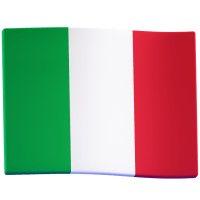How to speak German fluently in no time
Discover how to speak German fluently
● Use conversational connectors. Here are a few examples:
The bottom line is: just start speaking. If you are afraid of embarrassment, let Mondly help you practice.

German Speaking Exercises
Speak German fluently from day 1
Did you know that learning by doing is the most effective learning method? Practice German a little bit every day and you’ll speak like a native forever! Start right now with these top 10 most common German words and phrases pronounced by fluent German speakers.
1. Hallo. = Hello.
First impressions matter. Don’t let anyone tell you otherwise. Learning as little as “hello” in German can work wonders in your interactions with the natives. So here’s exactly how to pronounce it:
Hallo.
2. Wie geht's? = How are you?
The next polite thing to do is ask “how are you?”. Sometimes, you can even skip the hello and directly ask how things are going. Here’s how to pronounce it in German:
Wie geht's?
3. Wie heißt du? = What is your name?
When you travel abroad, you usually make a lot of new friends. Whether we are talking about the nice stranger on the plane, your host or the driver, here’s how to ask them what their name is:
Wie heißt du?
4. Nett, Sie kennenzulernen. = Nice to meet you.
The natives will always regard your attempt to speak their language as a sign of respect towards their culture. Another basic phrase you can use when making new friends is “nice to meet you”. Click and listen to how is it pronounced:
Nett, Sie kennenzulernen.
5. Bitte. = Please.
Manners are a must everywhere you go. And Germany makes no exception. Saying “please” the right way and at the right time will open many doors in your path. To pronounce it in German, you simply say:
Bitte.
6. Danke. = Thank you.
Mothers are the best thing that ever happened to us. Not only did they raise us, but they also taught us basic manners like saying “thank you” in the proper contexts. Following their example, here’s how to say “thank you” in German:
Danke.
7. Bitte schön. = You're welcome.
It doesn't matter where you are in the world. Common sense translates the same in all languages. Here's how a person from Berlin would say “you’re welcome”:
Bitte schön.
8. Entschuldigen Sie! = Excuse me!
We only need 7 seconds to make an impression that may last a lifetime. And sometimes, the only difference between a good impression and a bad one is just a simple “excuse me”. Listen to how it's pronounced in German:
Entschuldigen Sie!
9. Wie viel kostet das? = How much does it cost?
Shopping sprees are an essential part of every city break. The vacation isn’t over until you buy souvenirs for each member of your family. So here’s how to ask “how much does it cost?” in German:
Wie viel kostet das?
10. Tschüss. = Goodbye.
If you want to maintain the good first impression you managed to make with your flawless German greetings and introductions, end the conversation by saying “goodbye” exactly like a native:
Tschüss.
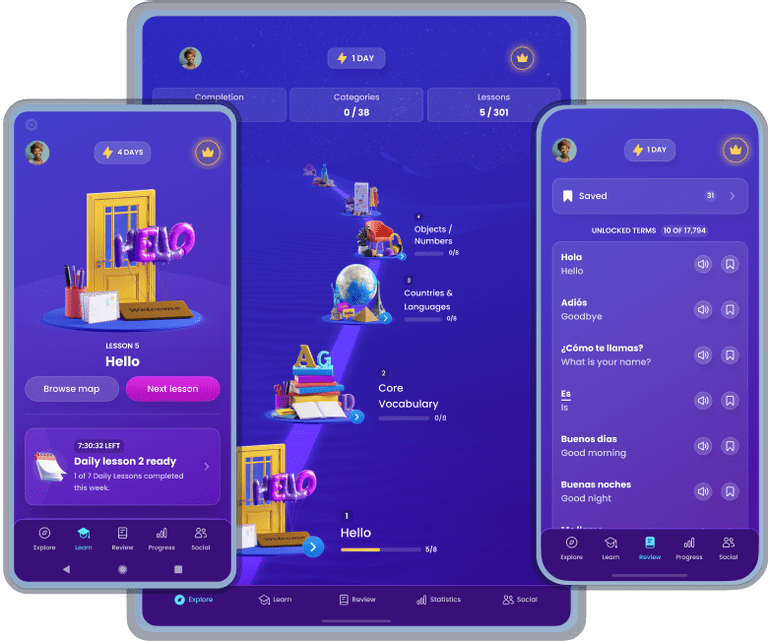
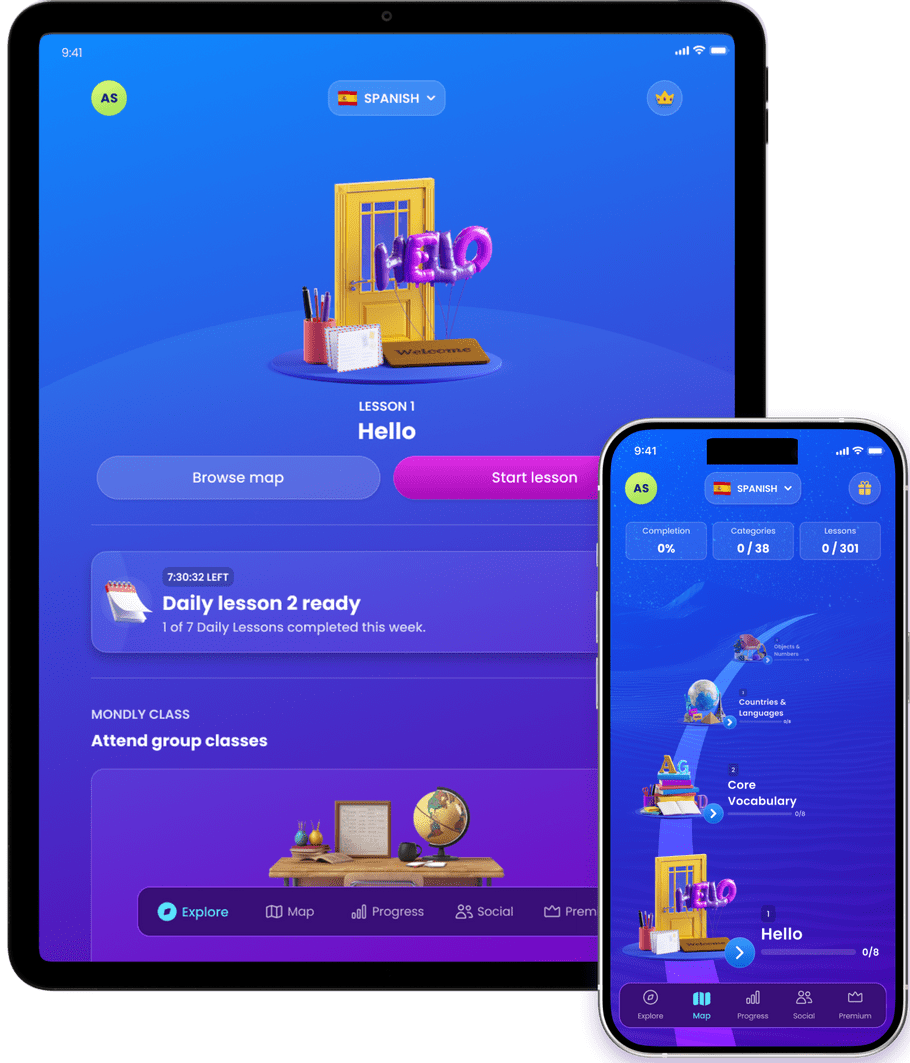
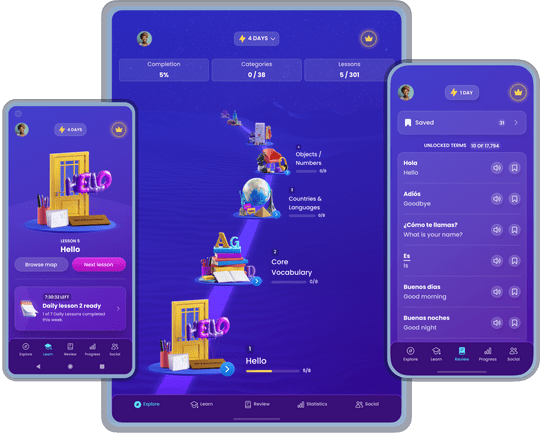

1 000 000+ + Ratings
Mondly was named "Editors' Choice" in Google Play and "Best New App" by Apple.
Basic German pronunciation rules
- ● ß sound – pronounced like a sharp ‘s’ sound.
- ● s sound – pronounced like the English ‘z’.
- ● ch sound – best described as a cat-hissing sound. Try saying ich or mich to practice.
- ● z sound – sounds like the ‘ts’ in ‘cats’.
- ● ä sound – similar to the ‘ai’ sound in ‘air’.
- ● ö sound – resembles the the famous French ‘eu’.
- ● ü sound – like the ‘u’ in ‘dude’.
- ● j sound – pronounced like the English ‘y’. Oh ya!
- ● v sound – like the English ‘f’. This is why the German Vater sounds so much like ‘father’.
- ● w sound – sounds like the English ‘v’.
- ● ig sound – pronounced like ‘ich’ at the end of the words. Practice by saying lustig (‘funny’) or ruhig (‘quiet’, ‘calm’).
- ● tsch sound – resembles the English ‘ch’ in ‘chair’ or ‘couch’.
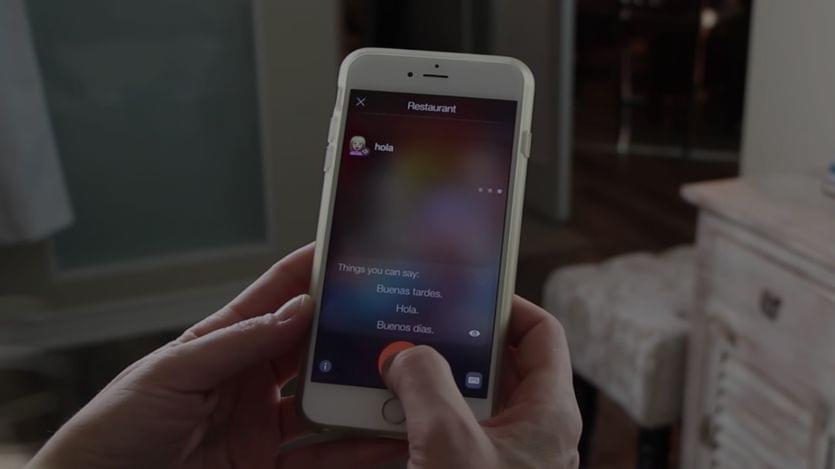

Speak German in Virtual Reality
Meet Mondly VR, the most advanced way to learn languages in virtual reality. Practice small-talk on a train to Berlin, book a hotel room in Munich, or order food in a restaurant in Frankfurt – all from the comfort of your home.
By offering prompts and evaluating users’ delivery with the help of speech recognition, Mondly VR mimics immersion learning for German like no other experience. Enjoy dynamic conversations with our virtual characters and boost your conversational confidence in real-life scenarios. You’ll get instant feedback on your pronunciation, intelligent suggestions to enrich your vocabulary and surprises that will transform language practice into a game-like experience.
Are you ready to discover the power of immersion in virtual reality? Speak German in Mondly VR without fear of embarrassment!


Did you know?

The good news is that German is easier to speak than read or write. While in many languages you have to memorize a lot of grammar rules in order to speak the language at a basic level, in German you only need to learn one verb conjugation. In its written form, German can be complex and different grammar rules apply, but while speaking you generally only use the present perfect tense such as “I have slept” or “I have gone to the market”. This makes things easy and helps you have basic conversations from day one.

Speaking German has major benefits

Being able to speak with over 210 million German speakers
German is the 11th most spoken language worldwide, so you'll definitely have a lot to gain by learning conversational German. For example, you'll be able to interact with people anytime you visit Germany, Switzerland or Austria.

Traveling to German speaking countries gets way better
Wherever you plan to travel to Berlin or Vienna, speaking German will enhance your experience significantly. You will be able to experience German speaking countries like a native and have an authentic experience in the process.

Speaking German can save your career
Being able to speak German increases your employability significantly and makes you stand out from the crowd. This means that you will have better chances of getting a well paid job in the first place, better chances of getting promoted or getting a better job in a German speaking country.

Speaking German makes you smarter
Studies indicate that being bilingual or a polyglot increases the grey matter in your brain. This means that speaking German makes you smarter than you currently are. So, what are you waiting for?














